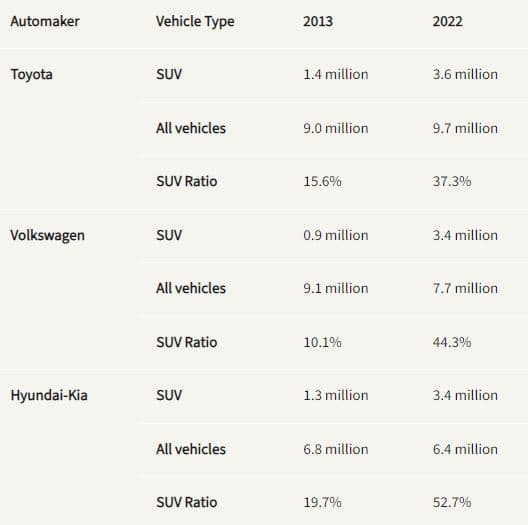The significant sales of thermal SUVs from the world’s three main manufacturers (Toyota, Volkswagen and Hyundai-Kia) completely cancel out the climate benefits of electric vehicles from those same manufacturers. This is stated in a report by the Greenpeace affiliate based in East Asia, published this Wednesday, November 29, on the eve of the opening of COP28.
From 15 to 40% of sales in less than 10 years
“The greatest constructors of world automobiles are launched by corps perdu dans la fabrication de SUV, poussant encore avantage la planète vers la catastrophe climatique”, s’alarm Erin Choi, porte-parole de Greenpeace Asie de l’Est, citée dans le communiqué long.
The environmental organization’s report recalls the sharp increase in the share of SUVs – those “sports utility vehicles” that are as imposing as they are polluting – in the total sales of the main global manufacturers between 2013 and 2022.
At Toyota, this share of SUVs increased between 2013 and 2022 from 15.6% to 37.3% of sales, from 10.1% to 44.3% at Volkswagen and from 19.7% to 52.7% at Hyundai-Kia.
In total, all manufacturers combined, SUVs’ share of new vehicle sales increased from 15.4% to 40.8% during the same period.

330 million SUVs in circulation worldwide
The number of SUVs in circulation worldwide increased from less than 50 million examples in 2010 to 330 million in 2022, “or 1.3 times the total number of vehicles registered in the European Union,” according to the report.
All of these SUVs emitted more than 900 million tons of CO2 on the road in 2021: if this car park formed a country, it would have ranked sixth among the most polluting countries in the world that year.
In fact, Greenpeace estimates that over its useful life, an SUV emits around 12% more CO2 than a sedan.
Negative result despite efforts in electricity
CO2 emissions derived from the use of SUVs from South Korea’s Hyundai-Kia, Germany’s Volkswagen and Japan’s Toyota (excluding emissions linked to the manufacturing of these vehicles) amounted to 298 million tons in 2022, according to Greenpeace calculations.
At the same time, CO2 emissions avoided by the use of electric vehicles from these same manufacturers last year amounted to only 9 million tons, according to this report. A largely negative assessment.
Please note that this study was not based on CO2 emissions generated during the entire life cycle of a vehicle, which also includes its particular production phase.
But road emissions are responsible for “between 70 and 80%” of the total and, in most cases, an electric vehicle also generates fewer emissions than a thermal vehicle throughout its life cycle, Greenpeace told the AFP.
Greenpeace calls for stopping “greenwashing”
“It’s time for the auto industry to stop greenwashing,” Erin Choi writes in the press release. “Hyundai, Volkswagen and other manufacturers must reduce the size of their SUV fleets while electrifying” their sales.
Greenpeace also takes a dim view of the growing trend of electric SUVs, because these models have a larger carbon footprint than other electric cars, particularly because more steel is needed to manufacture them.
A previous WWF report denounced this race for electric SUVs, especially considering their significant use of critical metals, with environmental risks and shortages of raw materials to meet demand.
The NGO demanded in particular the expansion of weight penalty to these electric SUV models, currently saved due to the high mass of the batteries and the ongoing transition towards these “zero emissions” engines.
Source: BFM TV

